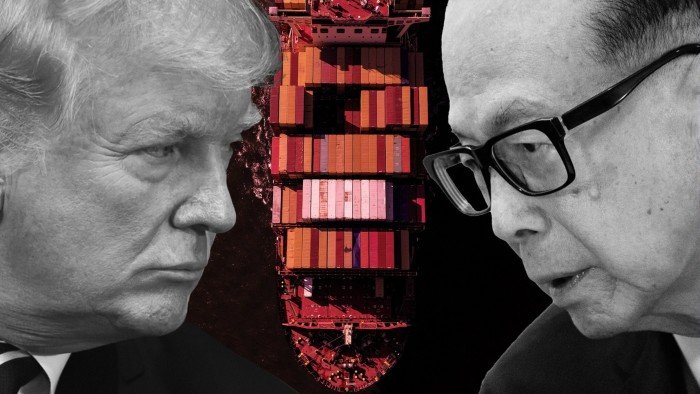If anyone can take the long view on Donald Trump, it is Li Ka-shing, the 96-year-old Hong Kong billionaire who fled the Sino-Japanese war as a child and built a global empire from scratch.
The US president has said “China is operating the Panama Canal”, pointing to CK Hutchison’s operation of two ports there, a claim that echoes concerns first voiced when the group secured the contracts in 1997.
Panamanian lawyers have launched a lawsuit in an attempt to cancel the concessions, while the government of Panama is auditing the group.
Hong Kong’s richest man, nicknamed “Superman”, has built his group spanning ports, retail, infrastructure and telecoms on strategic investments in the west. While he has weathered criticism over links to China before, including in Australia and the UK, the latest onslaught comes at a tricky time.
The company is under pressure to boost its shares — which have fallen more than 40 per cent over the past five years and underperform Hong Kong’s Hang Seng benchmark — and to dip into its more than HK$130bn (US$16.7bn) war chest to secure bigger acquisitions such as the UK’s Thames Water.
Its infrastructure arm, CK Infrastructure, this month made a preliminary £7bn bid for a majority stake in Thames Water, rivalling a £4bn bid from US private equity firm KKR. Analysts anticipate pushback over its ties to China.
“We don’t rule out geopolitics constraining the CK group’s expansion plans,” said Lorraine Tan, director of Asian equities research at Morningstar.
Li, who fled to British-run Hong Kong at the age of 12, had his start in plastics manufacturing before expanding into property and telecoms. The company in 2023 reported profit of $3bn and is one of Hong Kong’s largest conglomerates.
Like many Hong Kong tycoons of his generation, Li ran his company differently to those in mainland China, where businesses are subject to tighter government control.
But since the territory’s handover to China in 1997, Hong Kong businesses have been increasingly perceived as Chinese, particularly after pro-democracy protests in 2019 and the introduction of a sweeping national security law the following year.
In 2020, the Trump administration revoked Hong Kong’s special trade privileges and said the US no longer considered the city as autonomous from China.
“Hong Kong used to benefit from the best of both worlds,” said a person in close contact with Hong Kong’s conglomerates, including CK Hutchison. “Now [companies] are caught up in the tug of war between the two sides [China and the west].”
While some Hong Kong tycoons — especially those with significant investments in China — have become closer to top Beijing officials since the handover, Li and CK Hutchison have had a trickier relationship.
Li supported the appointment of Beijing-backed hardliner John Lee as Hong Kong’s leader in 2022 and the introduction of the national security law. He has also affirmed his support for Xi Jinping as China’s leader and met Xi multiple times. But his sale of several of real estate holdings in China prompted criticism from state-affiliated media, including an article headlined “don’t let Li Ka-shing run away” in 2015.
His son Victor, who handles day-to-day operations, in 2023 was removed from the standing committee of China’s top political consultative body. “They [Li and his family] need to play it nice with Beijing and appear as patriotic individuals or companies,” said Jean-Pierre Cabestan, a senior research fellow at the Paris-based Asia Centre think-tank.
“Many governments, particularly the US government, have concluded that any Hong Kong company is an agent of the Chinese Communist party, which is obviously untrue, particularly CK Hutchison,” said Cabestan.
Li’s investments in the west remain pivotal to the group.
CK Hutchison generated more than half of its 2023 revenue from the UK, Europe and Canada, while less than a fifth stems from mainland China and Hong Kong.
In the UK, Li’s family controls UK Power Networks, Northumbrian Water and Phoenix Energy. Last year, the infrastructure arm bought 32 UK wind farms and launched a second listing on the London Stock Exchange.
Li’s conglomerate and subsidiaries also runs Eversholt Rail, the telecoms network Three UK, as well as health retailer Superdrug and the port of Felixstowe, one of Britain’s largest container ports. CK Asset, its property arm, owns the pub group Greene King, one of the biggest in the country.
Some observers and politicians expect its potential acquisition of Thames Water to face pushback.
The Labour government should ask themselves if it is “right [for] a company from a foreign state, where their national security law requires those companies to do as they’re told . . . [to operate strategically important utilities] and decide whether or not this can continue”, said former Tory leader Sir Iain Duncan Smith. “My view is it shouldn’t.”
For CK Hutchison, its focus is using its “fairly sizeable war chest” to make new investments, said Tan at Morningstar. “They would like to go back to being successful in making more meaningful acquisitions going forward.”
At 96, Li Ka-shing is in good health and regularly returns to the 70th-floor office of his conglomerate. The group did not respond to a request for comment.
A senior person close to Li previously told the Financial Times there was “nothing” the company could do about the fact that it was increasingly perceived as Chinese. But that perception “should not limit what we do”, the person said.
“We can’t change who we are,” the person said.
Data visualisation by Haohsiang Ko

